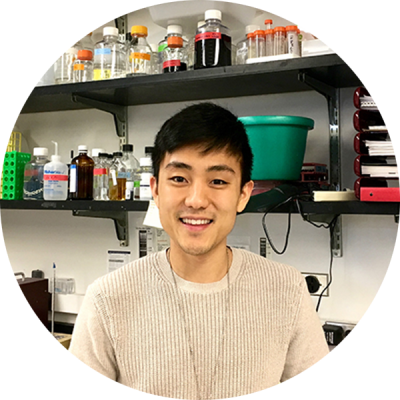
Chris Cho
As an M.D./Ph.D. student, I have had the great opportunity to pursue my graduate studies in the laboratory of Dr. Jeremy Nathans. Our lab studies how blood vessels develop in the central nervous system. We have shown that two cell-surface proteins, Reck and Gpr124, are required for neurovascular development by activating signals associated with a protein called Wnt7a/7b (ligand) in endothelial cells. Furthermore, we demonstrate that Reck and Gpr124 operate by assembling into a multiprotein complex with Wnt7a/7b and another protein called Frizzled (receptor).
In humans, there are 19 Wnts and 10 Frizzleds, but the extent of Wnt-Frizzled specificity and the biological roles that such specificity might play have largely remained open questions. Our work supports a novel paradigm for Wnt specificity and signifies the exciting possibility that receptor co-factors like Reck and Gpr124 exist for the other 17 Wnt ligands. Identifying these factors will be an important future direction for the field.
Questions & Answers
Why did you choose Johns Hopkins for your work?
Aside from the clinical and scientific excellence at Johns Hopkins, I was most impressed by the exceptional collegiality and infectious energy demonstrated by the students, staff members and faculty members. There is a willingness to work together and excitement to conduct cutting-edge research. I was drawn to Johns Hopkins for these reasons.
My older brother also matched at Johns Hopkins for his residency in anesthesiology at the same time I was deciding among M.D./Ph.D. programs. Wanting to be closer to my family also played an important part in my decision.
What does receiving this award mean to you personally and professionally? Do you have any connection with the particular award you received?
While I do not have any personal connection with the Michael A. Shanoff Award, I am aware of the former recipients of this prestigious award. To be included in the company of such successful and talented scientists is truly an honor.
What contributed to your project’s success (special skills, interests, opportunities, guidance, etc.)?
Two people immediately come to mind. First is my thesis adviser, Dr. Jeremy Nathans. From the onset of my graduate training, he challenged me to think deeply and work rigorously. He taught me to carve out hypotheses and to learn how to “kill” them—that is, to do the one experiment that would prove your favorite hypothesis wrong. He encouraged me to be clever and curious. And,he showed all of this by example, every single day, in his office or at his bench. The second person is Philip Smallwood, a senior technician in the lab and a dear friend. In addition to all of his technical support over the years, he has reminded me that scientific work ultimately stems from people and to never forget the importance of that humanity. Both of these individuals were a huge part of my success.
What thoughts do you have about Young Investigators’ Day itself, as a celebration of the roles student and fellows play in research at Johns Hopkins?
The celebration of young talent is quite exceptional in the way it can trickle down and excite other younger individuals. I remember sitting in the audience as a first-year medical student in 2014, listening to the Young Investigators’ Day presentations and being so impressed by the quality, breadth and significance of the work conducted by the awardees. Specifically, Eliah Shamir—a former M.D./Ph.D. trainee, the winner of the Martin and Carol Macht Award, and my then-student role model—comes to mind. I hope that our scientific contributions will similarly inspire the younger trainees and encourage them to push the boundaries of their respective fields.
What has been your best/most memorable experience while at Johns Hopkins?
I can’t place a single experience, but what comes to mind are the late nights studying with my graduate school friends at coffee shops, crowding around a computer with my lab mates while analyzing the latest exciting data, and celebrating our personal and professional milestones along the way.
What are your plans over the next year or so?
I plan to defend my Ph.D. thesis in July 2018 and return to medical school in the fall.
Tell us something interesting about yourself that makes you unique. Do you have any special hobbies, interests or life experiences?
Outside of lab, I am a dancer with Charm City Ballet, a Baltimore County-based performance company. I have been featured in A Christmas Carol (2015–2017) as Young Scrooge and Ignorance, Beauty and the Beast (2016) as the Beast, and Aladdin (2017) as Aladdin. Currently, I am preparing for the role of Prince Eric in our upcoming performance of The Little Mermaid (June 9 and 10, 2018). You can check us out at www.charmcityballet.com.